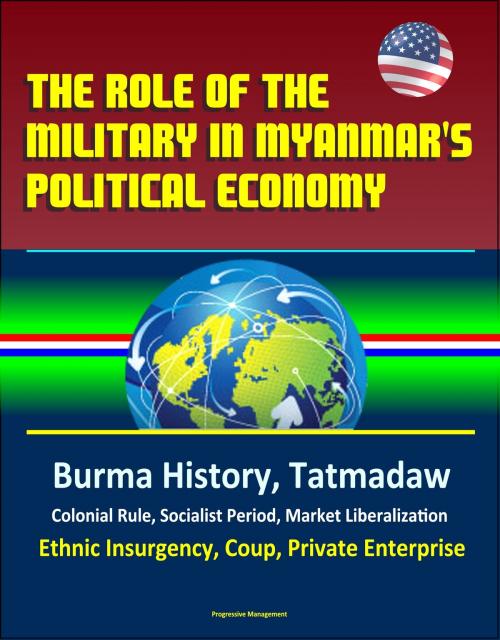The Role of the Military in Myanmar's Political Economy: Burma History, Tatmadaw, Colonial Rule, Socialist Period, Market Liberalization, Ethnic Insurgency, Coup, Private Enterprise
Nonfiction, History, Asian, Southeast Asia, Military, Strategy| Author: | Progressive Management | ISBN: | 9781370394616 |
| Publisher: | Progressive Management | Publication: | October 9, 2016 |
| Imprint: | Smashwords Edition | Language: | English |
| Author: | Progressive Management |
| ISBN: | 9781370394616 |
| Publisher: | Progressive Management |
| Publication: | October 9, 2016 |
| Imprint: | Smashwords Edition |
| Language: | English |
This important report has been professionally converted for accurate flowing-text e-book format reproduction. This study examines the role of Myanmar's military, the Tatmadaw, in the country's political economy. Using a hybrid of the new institutional economics and the developmental state model as the analytical framework, a historical comparative analysis of Myanmar's political economic institutions during its socialist period (1962-1988) and market liberalization period (1988-2010) reveals that the Tatmadaw was a major actor with a dominant role in shaping Myanmar's political economic institutions. Myanmar's socialist trajectory was enabled by the Tatmadaw's monopoly of force and motivated largely by national security and the Tatmadaw leaders' colonial experience. Under the Tatmadaw's leadership, socialist and militaristic institutions became ingrained in Myanmar's political economy while the development of market-oriented institutions became significantly restrained. Although distorted political economic institutions caused the decline of Myanmar's economy, the Tatmadaw's desire to maintain political power was the key motivator for the regime to abandon socialism and embrace capitalism. Granted that Myanmar's private sector has grown since market liberalization, lingering socialist-era norms continue to negatively influence the development of Myanmar's economic policy and misshape emerging economic institutions.
Chapter II outlines the analytical framework of this thesis. The chapter provides brief background information on NIE and the developmental state model. The chapter also discusses the motivation behind the NIE developmental state framework and specifies how this thesis will use the framework to analyze Myanmar's political economy. Chapter III addresses Myanmar's economic developments during the socialist period between 1962 and 1988. The chapter describes conditions and events that influenced the development of economic institutions under socialism. Additionally, Chapter III contrasts Myanmar's socialist political economy with that of the developmental state model. Chapter IV analyzes the development of Myanmar's market liberalization period from 1988 to 2010 and describes and traces the interactions of events that influenced the shifts in Myanmar's economic institutions. An evaluation of the development of Myanmar's market-based economy from a developmental state point of view is also included in Chapter IV. Chapter V is a comparative analysis between the socialist and market-economy period to assay the role of the Tatmadaw in framing and influencing institutional changes. Furthermore, a comparison between Myanmar's institutions to those of the developmental state model is presented. Chapter VI summarizes the major findings of this thesis.
This important report has been professionally converted for accurate flowing-text e-book format reproduction. This study examines the role of Myanmar's military, the Tatmadaw, in the country's political economy. Using a hybrid of the new institutional economics and the developmental state model as the analytical framework, a historical comparative analysis of Myanmar's political economic institutions during its socialist period (1962-1988) and market liberalization period (1988-2010) reveals that the Tatmadaw was a major actor with a dominant role in shaping Myanmar's political economic institutions. Myanmar's socialist trajectory was enabled by the Tatmadaw's monopoly of force and motivated largely by national security and the Tatmadaw leaders' colonial experience. Under the Tatmadaw's leadership, socialist and militaristic institutions became ingrained in Myanmar's political economy while the development of market-oriented institutions became significantly restrained. Although distorted political economic institutions caused the decline of Myanmar's economy, the Tatmadaw's desire to maintain political power was the key motivator for the regime to abandon socialism and embrace capitalism. Granted that Myanmar's private sector has grown since market liberalization, lingering socialist-era norms continue to negatively influence the development of Myanmar's economic policy and misshape emerging economic institutions.
Chapter II outlines the analytical framework of this thesis. The chapter provides brief background information on NIE and the developmental state model. The chapter also discusses the motivation behind the NIE developmental state framework and specifies how this thesis will use the framework to analyze Myanmar's political economy. Chapter III addresses Myanmar's economic developments during the socialist period between 1962 and 1988. The chapter describes conditions and events that influenced the development of economic institutions under socialism. Additionally, Chapter III contrasts Myanmar's socialist political economy with that of the developmental state model. Chapter IV analyzes the development of Myanmar's market liberalization period from 1988 to 2010 and describes and traces the interactions of events that influenced the shifts in Myanmar's economic institutions. An evaluation of the development of Myanmar's market-based economy from a developmental state point of view is also included in Chapter IV. Chapter V is a comparative analysis between the socialist and market-economy period to assay the role of the Tatmadaw in framing and influencing institutional changes. Furthermore, a comparison between Myanmar's institutions to those of the developmental state model is presented. Chapter VI summarizes the major findings of this thesis.















